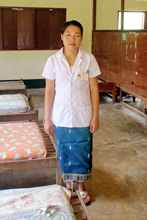
New Publication Spotlight: Evidence from a Discrete Choice Experiment in Lao People’s Democratic Republic
Which incentives would motivate health workers to serve in rural and remote areas of the Lao People’s Democratic Republic (PDR), where nurses disproportionately live and work in urban centers?
To find out, the Lao Ministry of Health—with technical assistance from CapacityPlus and in collaboration with the World Health Organization (WHO)—used CapacityPlus’s Rapid Retention Survey Toolkit to conduct a discrete choice experiment among health professional students and practicing health workers. Results and conclusions from the discrete choice experiment are presented in an article published in May in the journal Human Resources for Health: “Differences in Preferences for Rural Job Postings Between Nursing Students and Practicing Nurses: Evidence from a Discrete Choice Experiment in Lao People’s Democratic Republic.” Authors include CapacityPlus’s Wanda Jaskiewicz and Kate Tulenko, as well as key contributors from the Ministry of Health and WHO/Lao PDR.
Results and conclusions from the discrete choice experiment are presented in an article published in May in the journal Human Resources for Health: “Differences in Preferences for Rural Job Postings Between Nursing Students and Practicing Nurses: Evidence from a Discrete Choice Experiment in Lao People’s Democratic Republic.” Authors include CapacityPlus’s Wanda Jaskiewicz and Kate Tulenko, as well as key contributors from the Ministry of Health and WHO/Lao PDR.
What is the discrete choice experiment?
The discrete choice experiment is a quantitative methodology that can determine the relative importance health workers place on different job characteristics and predict their decision-making about job postings using hypothetical choice data. CapacityPlus’s Rapid Retention Survey Toolkit employs a simplified but reliable version of the methodology designed to be used by health workforce managers or other health leaders without having to rely on technical research experts.
Findings show important differences in job preferences
As described in the Human Resources for Health article, application of the discrete choice experiment in Lao PDR found that salary and direct promotion to permanent staff strongly influenced both students’ and nurses’ choice of job posting. However, as compared to nursing students, practicing nurses had significantly lower preference for housing allowance and housing provision as incentives, as well as lower preference for provision of transportation for work and personal use.
These important differences in preferences for rural job posting attributes among nursing students and practicing nurses suggest that it may be important to differentiate between recruitment and retention policies when addressing health workforce challenges in developing countries such as Lao PDR.
New policy informed by survey results
The Lao Ministry of Health costed the preferred incentive packages resulting from the discrete choice experiment to determine their financial feasibility using the iHRIS Retain software developed by CapacityPlus in collaboration with the WHO.
Informed by the survey and costing results, the government launched a new recruitment and retention policy in October 2012 stipulating that all graduates of health professional programs must complete three years of rural service to receive their licenses to practice. The policy also provides a combination of incentives revealed through the discrete choice experiment to motivate health workers to deliver high-quality services while carrying out their rural service, as well as encourage them to stay on after compulsory service.
Help CapacityPlus spread the word about strengthening the health workforce. Follow us on Twitter and like us on Facebook.
Related items:
Photo by Wanda Jaskiewicz. (Health worker at a district hospital in Luang Prabang Province, Lao PDR)


